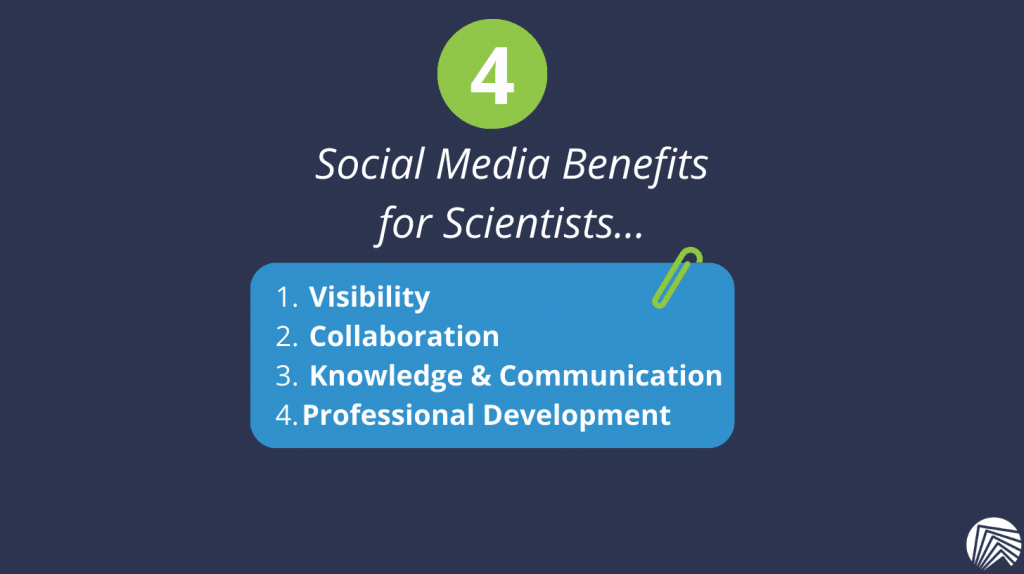In an age where digital connectivity shapes the fabric of society, the integration of social media into professional domains has become increasingly pervasive. This phenomenon holds particular significance for scientists, who find themselves navigating an evolving landscape where online platforms serve as more than just avenues for personal expression. Beyond cat videos and status updates, social media presents scientists with unique opportunities for visibility, outreach, and collaboration. The multifaceted role of social media for scientists cannot be overstated, as it encompasses visibility, collaboration, communication, and career development. Social media platforms offer scientists unprecedented opportunities to connect with diverse audiences, foster interdisciplinary collaboration, disseminate knowledge, and advance their careers in academia and industry. When used responsibly, social media has the potential to drive positive change in the scientific community, fostering transparency, accessibility, and inclusivity in scientific discourse. Today’s scientists must embrace social media as a powerful tool for advancing their research, engaging with broader society, and contributing to the collective pursuit of knowledge and understanding. Social media is here to stay. By taking advantage of the potential of social media, scientists can amplify their impact, broaden their horizons, and shape the future of science in meaningful ways.
Also Read:

The Role of Social Media for Scientists
Visibility and Outreach
Various social media platforms have emerged as indispensable tools for scientists seeking to extend the reach of their work beyond traditional academic circles. Through strategic utilization of platforms like X (formerly known as Twitter), Instagram, and YouTube, scientists can transcend the confines of journal publications and academic conferences, engaging directly with diverse audiences worldwide. By sharing insights, discoveries, and even the everyday realities of scientific inquiry, researchers can cultivate a sense of transparency and accessibility that fosters public trust in the scientific process. Moreover, social media facilitates the amplification of scientific findings, enabling rapid dissemination of information that can catalyze societal dialogue and inform public policy. From live-tweeting conferences to crafting engaging science communication videos, scientists are harnessing the power of social media to bridge the gap between academia and the wider world, inspiring curiosity, and fostering informed discourse on pressing scientific issues.
Collaboration and Networking
Social media platforms serve as dynamic hubs where scientists can connect, collaborate, and exchange ideas across disciplinary boundaries and geographic divides. With the click of a button, researchers can engage in meaningful discussions, share resources, and seek out potential collaborators who possess complementary expertise. Case studies abound showcasing the transformative impact of social media in forging interdisciplinary research teams, where individuals with diverse backgrounds converge to tackle complex scientific challenges with fresh perspectives. Platforms like ResearchGate and Academia.edu further augment these efforts by providing specialized spaces for academic networking, enabling scholars to showcase their work, solicit feedback, and establish connections with peers and potential collaborators around the globe. In an increasingly interconnected world, social media emerges as a catalyst for innovation, driving collaboration and fostering the cross-pollination of ideas that propels scientific progress forward.
Knowledge Dissemination and Science Communication
By democratizing access to scientific knowledge, social media platforms play a pivotal role in breaking down traditional barriers to information dissemination. Scientists can share their findings directly with diverse audiences, bypassing the gatekeeping mechanisms of traditional publishing channels. Moreover, effective science communication on social media is essential for bridging the gap between the scientific community and the general public. Through clear, concise, and engaging communication strategies, scientists can translate complex concepts into accessible language, making science more relatable and relevant to broader audiences. Furthermore, social media empowers scientists to combat misinformation and promote evidence-based thinking in an era rife with pseudoscience and false narratives. Whether through fact-checking posts, informative videos, or engaging infographics, scientists can leverage their expertise and credibility to counteract misinformation and cultivate a culture of scientific literacy and critical thinking on social media platforms.
Professional Development and Career Opportunities
Social media platforms are invaluable resources for scientists seeking to advance their careers in both academia and industry. These platforms offer a wealth of opportunities for career development, providing avenues for networking, knowledge sharing, and professional growth. Among these, LinkedIn stands out as a powerful tool for scientists, offering features tailored to facilitate job searches, connect with industry professionals, and showcase one’s expertise and achievements. By maintaining an active presence on LinkedIn and engaging with relevant communities and discussions, scientists can expand their professional networks, stay abreast of job opportunities, and establish themselves as thought leaders in their respective fields. To leverage social media effectively for career advancement and personal branding, scientists should strive to cultivate a compelling online presence that highlights their expertise, accomplishments, and professional interests. This can be achieved through regular posting of relevant content, active participation in discussions, and strategic networking with peers and influencers in their field. By harnessing the potential of social media, scientists can unlock new opportunities, amplify their impact, and carve out successful careers in the ever-evolving landscape of science and technology.

Challenges and Considerations
While social media presents numerous opportunities for scientists, it also poses several challenges that warrant careful consideration. A significant concern is the potential for misinformation to spread rapidly across these platforms, undermining the credibility of scientific information and eroding public trust. Privacy concerns also loom large, as scientists must navigate the balance between sharing their work and protecting sensitive data or personal information. To address these challenges, scientists must adopt strategies for maintaining professionalism and integrity in their social media interactions. This includes adhering to ethical guidelines, fact-checking information before sharing, and transparently disclosing conflicts of interest. Additionally, cultivating critical thinking skills is essential for scientists navigating the vast landscape of scientific content on social media. By critically evaluating sources, scrutinizing claims, and seeking out reputable sources of information, scientists can mitigate the risks associated with misinformation and ensure that their online presence contributes positively to the scientific discourse.




